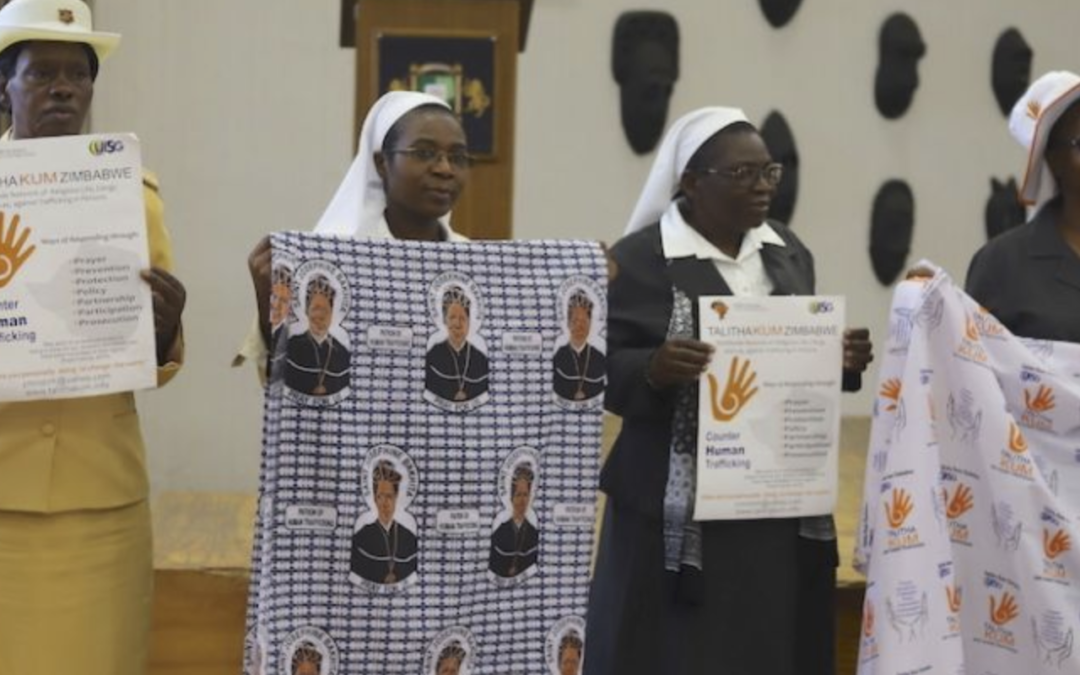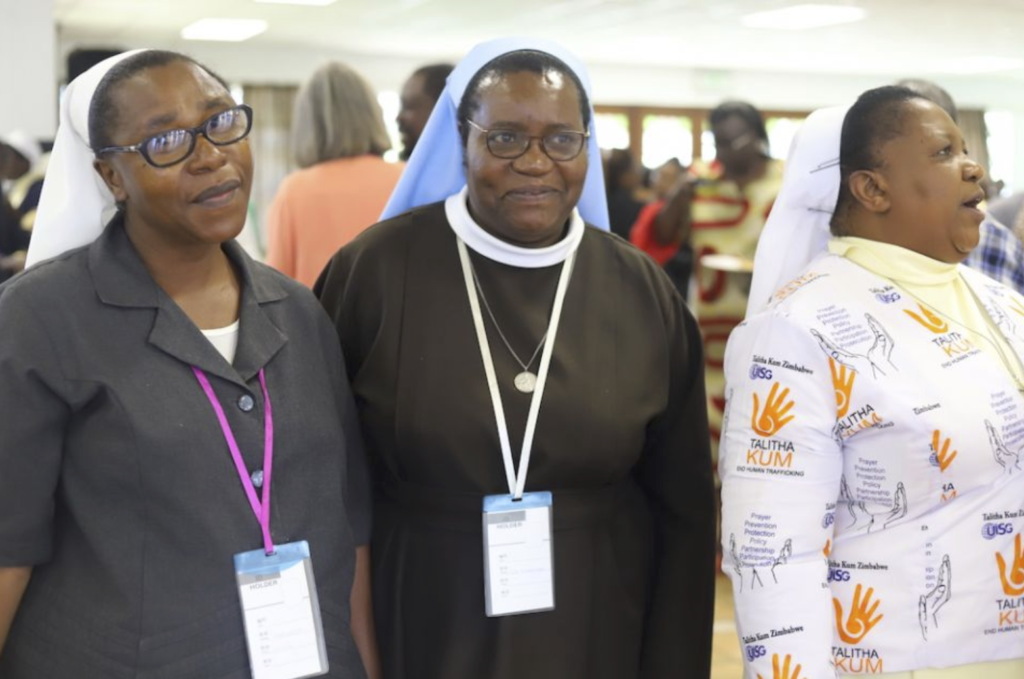
Lied to and abused, trafficked persons from Zimbabwe find some healing

Religious sisters attend the Regional Conference on Human Trafficking, March 18 at Arrupe Jesuit University in Harare, Zimbabwe. Center: Sr. Theresa Nyadombo of the Handmaids of Our Lady of Mount Carmel, education secretary for the Zimbabwe Catholic Bishops’ Conference, said a collaborative effort is needed to raise human trafficking awareness. (GSR photo/Doreen Ajiambo)
This article originally appeared on The Global Sisters Report
HARARE, ZIMBABWE — Jane sat on a hard, wooden chair at a church in Zimbabwe’s capital, Harare, and stared into space for some minutes. Then, she began to croon in worship and, a few minutes later, the gates of her heart burst open, and she began to pour out her heart to her Lord, tears flowing freely like a fountain.
“Father, I forgive my abusers and the people who caused me pain,” prayed the 37-year-old mother of two, who asked that Global Sisters Report not use her real name. “They treated me like an animal, like I didn’t matter, like I was a dog, worse than a dog. God, please heal my pain and heal my broken heart.”
Jane’s journey of pain began in 2016, when she was enticed by a trafficking agent in Harare with promises of a salary of $1,400 per month at a hotel in Kuwait, more than 3,000 miles away. Life had become unbearable in Zimbabwe after her husband lost his job as a casual laborer in a local milk factory and they were evicted from their house for nonpayment of rent.
“Life was very difficult and we barely had something to eat, and if we ate, it was one meal per day,” she said.
It was at this difficult time that she met her trafficker, who was well acquainted with her mother. Everything was planned quickly, and within one week, all her travel documents were ready, including her passport. She was given a new Islamic name: Amina Ishmael.

Religious sisters display cloth promoting work against human trafficking at the Regional Conference on Human Trafficking, March 18 at Arrupe Jesuit University in Harare, Zimbabwe. The conference was organized by the African Forum for Catholic Social Teaching and brought together various activists in the area of human trafficking. (GSR photo/Doreen Ajiambo)
Upon reaching Kuwait, she was picked up from the airport by a man who would be her boss. It was at his house that Jane realized she had been lied to and trafficked. Her host took away her travel documents and forcefully performed a medical procedure to check her overall health.
“I was raped every day, and I was helpless to do anything about it,” she said, weeping throughout the interview with GSR but insisting she wanted to tell her story. “I was forced to work day and night, beaten, restricted to go anywhere, threatened of arrest and deportation and unlawful withholding of my passport. I wasn’t even paid for the five months I worked at the home.”
When things became intolerable, she fled the home and took refuge in the Zimbabwe consulate. Jane was deported after a week, and upon arrival back in Zimbabwe, she was introduced to the religious sisters who run the African Forum for Catholic Social Teaching (AFCAST), an association of justice and peace practitioners throughout Africa, and who chaired the Counseling Services Unit, a group of doctors and counselors who assist the victims of human trafficking in Zimbabwe.
“As AFCAST, we deal with social problems that affect the people,” said Sr. Janice McLaughlin of the Maryknoll Sisters, who is one of the forum’s founders. “We focus our attention mainly on human trafficking and abuse of children and vulnerable adults. We always do our research and then we try to reach out to those affected or those we feel need help. All this is done by following Catholic social teaching and mission.”

Maryknoll Sr. Janice McLaughlin, one of the founders of the African Forum for Catholic Social Teaching, leads dozens of sisters in denouncing trafficking during the Regional Conference on Human Trafficking, March 18 at Arrupe Jesuit University in Harare, Zimbabwe. (GSR photo/Doreen Ajiambo)
‘There are no jobs here’
Jane is among the 40.3 million people who have been trafficked globally, including 24.9 million in forced labor and 15.4 million in forced marriage, according to 2016 estimates by the International Labor Organization, the most recent available data.
Human trafficking in Africa is an urgent crisis, and women and children are especially at risk. People can be trafficked within their own countries, to neighboring countries and to other continents for sexual exploitation, sexual slavery, forced marriage, domestic slavery and various forms of forced labor, according to the latest report by the United Nations.
Zimbabwe does not meet the minimum standards for eliminating human trafficking but is making significant efforts to do so, according to the 2019 Trafficking in Persons Report from the U.S. State Department. The report also notes that the southern African nation has been mapped as a source, destination and transit point for trafficking. In most of these cases, victims are vulnerable children and young adults.
In 2014, the Zimbabwe Parliament passed the Trafficking in Persons Act to identify those who have been trafficked, mitigate the illicit practice and prosecute trafficking offenders. However, it wasn’t until 2016 that the government launched the Trafficking in Persons National Plan of Action to enforce the law.
Since then, Zimbabwe’s government has made some headway in its efforts to end human trafficking. It investigated 72 potential cases of trafficking and prosecuted 42 cases in 2016, compared to none in the previous year. The government reported prosecuting 14 trafficking cases in 2017.
However, women and girls from Zimbabwean towns bordering South Africa, Mozambique and Zambia are still trafficked and subjected to forced labor and prostitution. In rural areas, men, women and children are also trafficked internally to farms for agricultural labor and to cities for forced domestic labor and commercial sexual exploitation, according to the U.S. State Department.
Along Robert Mugabe Road in Harare earlier this year, hundreds of young female travelers stood in queue, holding luggage and waiting for their turn to enter into a bus. The driver of the Citiliner bus, a South African coach company offering services from Harare to Johannesburg, told GSR that many of them were heading to neighboring South Africa to look for greener pastures.
One of them, a young blond woman in a navy dress, told GSR she felt there was no future for her in her home of Bulawayo in southwest Zimbabwe, and she was seeking opportunities in South Africa to help educate her siblings. She said her friend living in the United States had put her into contact with a woman in Johannesburg who promised to use her connections to find her a well-paying job as a maid.
She blamed poverty and lack of jobs in the country as a reason of migration. The World Bank estimates that extreme poverty in Zimbabwe has risen over the past few years, from 33.4% of the population in 2017 to 40% in 2019. The bank predicts levels will continue to rise in 2020, to between 6.6 million and 7.6 million people. That is about half of the people in this country, who are living on less than $1.90 per day.
“I have no choice but to go and try my luck,” the woman said on condition of anonymity, noting that she doesn’t even have regular migration documents. “I’m told that one needs to have at least $30 to bribe border officials, then they will let you in. There are no jobs here, so I have to try elsewhere to earn a living and help my family.”



